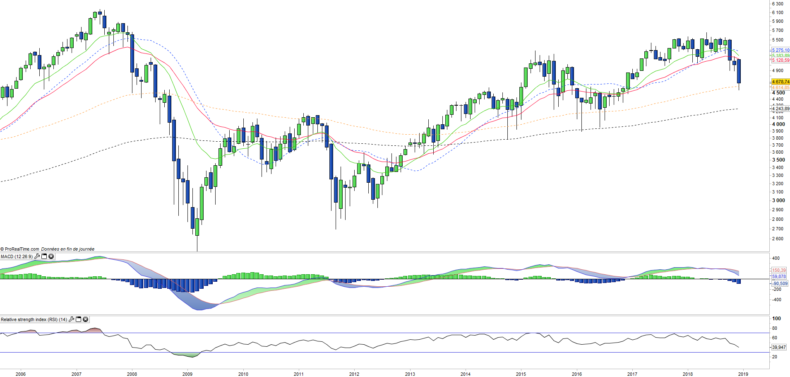Lyxor CAC 40 (CAC) - 31/12/2018
Short Term strategy: Negative (0%) / Trend -
Long Term strategy: Negative (30%) / Trend -
Characteristics of the ETF
The CAC ETF (Lyxor) replicates the CAC 40 index, which is composed of the 40 largest French securities representative of the main sectors of the french economy, while the securities are selected and weighted according to the size of their floating market capitalization.
The costs of the ETF CAC are quite low at 0.25% and the AUM is 3990M€. Replication is direct (physical) and there is a dividend distribution policy.
Alternative ETFs: C4D (Amundi in Euro), E40 (BNP Paribas in Euro)
Latest developments
In 2017, the CAC40 achieved a performance of 9.3% and after a rather chaotic first part of the year is now down sharply by 11.9% in 2018.
The dynamics of the CAC40 has become bearish since the month of October, which corresponds to the drop in global markets, especially in the US, because of growing fears of global growth, coupled with a less and less accommodating FED despite risks that accumulate as a result of the trade war between China and the US, the Brexit and the maturity of the growth cycle in the US that makes it more and more likely a recession in 2020.
However, global growth should remain positive in 2019 thanks to emerging countries while the growth of developed countries should ease in the United States because of the absence of triggers after the massive tax cuts of D. Trump and in Europe because of the considerable indebtedness of the States which limits their power.
Index & components
It should be noted that the 10 main holdings (which represent about 55% of the index) belong to very different sectors, unlike the DAX (overweight in industrial stocks) or the FTSE100 (pharmacy and financials), the CAC40 is indeed more composite in its sectoral composition.
However, three high-weighted stocks, Total (11.1%), Sanofi (8.1%) and LVMH (6.6%), can influence the index according to their own fundamental factors, which represents a bias.
From a sectoral point of view, we can see that the consumer goods sector represented by luxury goods and cosmetics such as LVMH or Loreal, is one of the most important for the index (16.2%), just behind industry (17.9%), financials (10.9%) and energy (11.9%).
The CAC40's stocks are often world leaders with a very international exposure, and little dependence on the domestic market and with a strong sensitivity to the US Dollar. French macroeconomic statistics have improved significantly since several months, but especially investors regained confidence with the election of Mr Macron, a liberal and pro-European.
The risk premium linked to the disastrous catastrophe scenario in the euro zone began to decline as soon as the first poll results were released, but the positive impact on French growth linked to the election momentum and hopes for structural reforms as well as the lowering of corporate and capital taxes confirmed in 2018 are still far from being fully integrated. France is at the beginning of a new cycle and strong, positive trends could start this time. The medium-term potential of the index is high, but is so far prevented by tough international context (trade war, FED) and EU politics (Brexit, Italy) and for a few weeks by internal issues (Yellow Vest).
Financials should be key, as they could benefit from the gradual rise in long-term rates as growth resumes and higher inflation expectations, as is already the case in the US, coupled with a more favorable political context.
Monthly data
The monthly chart shows a strong stall that started in October and worsened in December despite the period usually favourable to a rebound. However the decline seems to pause on the EMA100, key level for the index that has been used as support during the last corrections of 2014 and 2016 and resistance between 2010 and 2012. A rebound on this support is likely to come in place, even if it is likely to be retested later.
Weekly data
The weekly data show a deep correction, with a hammer-shaped candlestick that despite its modest size seems to announce a rebound. The objective of this rebound seems rather limited because of the intensity of the decline and a still hesitant buying reaction. The index should nonetheless come to retest the EMA200 currently at 4937 pts, a level at which a pull back is likely.
Theme
CAC is a UCITS ETF, listed in EUR, which seeks to replicate the CAC40 index (40 french companies)
Characteristics
| Inception date | 13/12/2000 |
| Expense ratio | 0,25% |
| Issuer | Lyxor |
| Benchmark | indice CAC 40 (PX1) |
| code/ticker | CAC |
| ISIN | FR0007052782 |
| UCITS | Yes |
| EU-SD Status | Out of scope |
| Currency | EUR |
| Exchange | Euronext Paris |
| Assets Under Management | 3 966 M€ |
| Replication Method | Direct (Physical) |
| PEA (France) | Yes |
| SRD (France) | Yes |
| Dividend | Distribution |
| Currency Risk | No |
| Number of Holdings | 40 |
| Risk | 3/5 |
Country Breakdown
| France | 97% |
| Switzerland | 1% |
| Luxembourg | 1% |
| United Kingdom | 1% |
Sector Breakdown
| Industrials | 18% |
| Consumer staples | 16% |
| Energy | 12% |
| Consumer discretionary | 12% |
| Financials | 11% |
| Health Care | 10% |
| Materials | 6% |
| Others | 14% |
Top Ten Holdings
| Total SA | 11% |
| Sanofi | 8% |
| LVMH | 7% |
| L'Oreal | 5% |
| Airbus | 5% |
| Air Liquide | 4% |
| BNP Paribas | 4% |
| AXA | 4% |
| Danone | 4% |
| Vinci | 3% |


